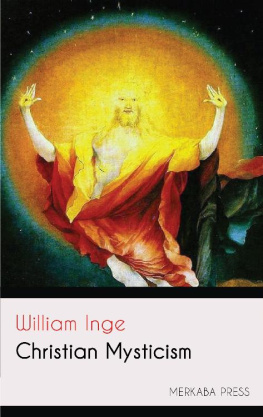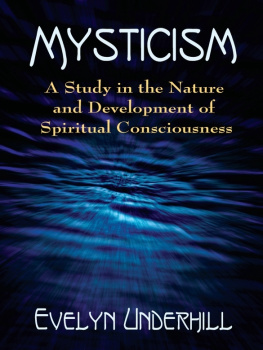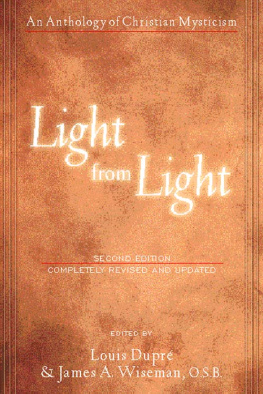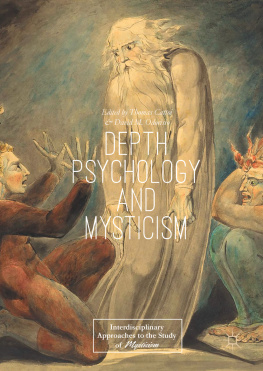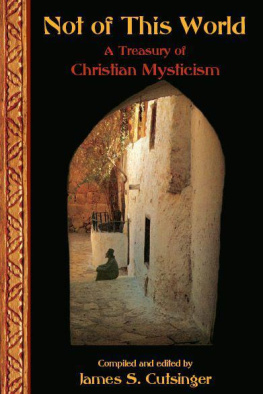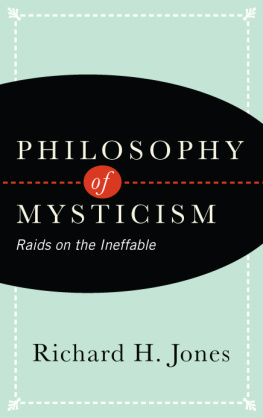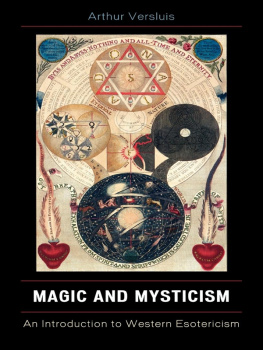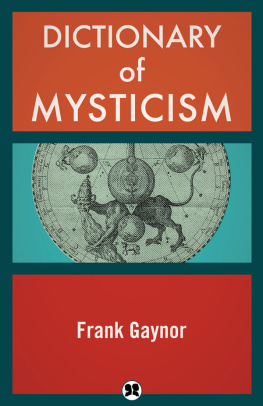2017

All rights reserved
TABLE OF CONTENTS
GENERAL CHARACTERISTICS OF MYSTICISM
"Beloved, now are we children of God, and it is not yet made manifest what we shall be. We know that, if He shall be manifested, we shall be like Him; for we shall see Him even as He is."I JOHN iii. 2, 3.
No word in our languagenot even "Socialism"has been employed more loosely than "Mysticism." Sometimes it is used as an equivalent for symbolism or allegorism, sometimes for theosophy or occult science; and sometimes it merely suggests the mental state of a dreamer, or vague and fantastic opinions about God and the world. In Roman Catholic writers, "mystical phenomena" mean supernatural suspensions of physical law. Even those writers who have made a special study of the subject, show by their definitions of the word how uncertain is its connotation.[2] It is therefore necessary that I should make clear at the outset what I understand by the term, and what aspects of religious life and thought I intend to deal with in these Lectures.
The history of the word begins in close connexion with the Greek mysteries.[3] A mystic [Greek: mysts] is one who has been, or is being, initiated into some esoteric knowledge of Divine things, about which he must keep his mouth shut ([Greek: myein]); or, possibly, he is one whose eyes are still shut, one who is not yet an [Greek: epopts].[4] The word was taken over, with other technical terms of the mysteries, by the Neoplatonists, who found in the existing mysteriosophy a discipline, worship, and rule of life congenial to their speculative views. But as the tendency towards quietism and introspection increased among them, another derivation for "Mysticism" was foundit was explained to mean deliberately shutting the eyes to all external things.[5] We shall see in the sequel how this later Neoplatonism passed almost entire into Christianity, and, while forming the basis of medival Mysticism, caused a false association to cling to the word even down to the Reformation.[6]
The phase of thought or feeling which we call Mysticism has its origin in that which is the raw material of all religion, and perhaps of all philosophy and art as well, namely, that dim consciousness of the beyond, which is part of our nature as human beings. Men have given different names to these "obstinate questionings of sense and outward things." We may call them, if we will, a sort of higher instinct, perhaps an anticipation of the evolutionary process; or an extension of the frontier of consciousness; or, in religious language, the voice of God speaking to us. Mysticism arises when we try to bring this higher consciousness into relation with the other contents of our minds. Religious Mysticism may be defined as the attempt to realise the presence of the living God in the soul and in nature, or, more generally, as the attempt to realise, in thought and feeling, the immanence of the temporal in the eternal, and of the eternal in the temporal. Our consciousness of the beyond is, I say, the raw material of all religion. But, being itself formless, it cannot be brought directly into relation with the forms of our thought. Accordingly, it has to express itself by symbols, which are as it were the flesh and bones of ideas. It is the tendency of all symbols to petrify or evaporate, and either process is fatal to them. They soon repudiate their mystical origin, and forthwith lose their religious content. Then comes a return to the fresh springs of the inner lifea revival of spirituality in the midst of formalism or unbelief. This is the historical function of Mysticismit appears as an independent active principle, the spirit of reformations and revivals. But since every active principle must find for itself appropriate instruments, Mysticism has developed a speculative and practical system of its own. As Goethe says, it is "the scholastic of the heart, the dialectic of the feelings." In this way it becomes possible to consider it as a type of religion, though it must always be remembered that in becoming such it has incorporated elements which do not belong to its inmost being.[7] As a type of religion, then, Mysticism seems to rest on the following propositions or articles of faith:
First, the soul (as well as the body) can see and perceive[Greek: esti de psychs aisthsis tis], as Proclus says. We have an organ or faculty for the discernment of spiritual truth, which, in its proper sphere, is as much to be trusted as the organs of sensation in theirs.
The second proposition is that, since we can only know what is akin to ourselves,[8] man, in order to know God, must be a partaker of the Divine nature. "What we are, that we behold; and what we behold, that we are," says Ruysbroek. The curious doctrine which we find in the mystics of the Middle Ages, that there is at "the apex of the mind" a spark which is consubstantial with the uncreated ground of the Deity, is thus accounted for. We could not even begin to work out our own salvation if God were not already working in us. It is always "in His light" that "we see light." The doctrine has been felt to be a necessary postulate by most philosophers who hold that knowledge of God is possible to man. For instance, Krause says, "From finite reason as finite we might possibly explain the thought of itself, but not the thought of something that is outside finite reasonable beings, far less the absolute idea, in its contents infinite, of God. To become aware of God in knowledge we require certainly to make a freer use of our finite power of thought, but the thought of God itself is primarily and essentially an eternal operation of the eternal revelation of God to the finite mind." But though we are made in the image of God, our likeness to Him only exists potentially.[9] The Divine spark already shines within us, but it has to be searched for in the innermost depths of our personality, and its light diffused over our whole being.
This brings us to the third proposition"Without holiness no man may see the Lord"; or, as it is expressed positively in the Sermon on the Mount, "Blessed are the pure in heart: for they shall see God." Sensuality and selfishness are absolute disqualifications for knowing "the things of the Spirit of God." These fundamental doctrines are very clearly laid down in the passage from St. John which I read as the text of this Lecture. The filial relation to God is already claimed, but the vision is inseparable from likeness to Him, which is a hope, not a possession, and is only to be won by "purifying ourselves, even as He is pure."
There is one more fundamental doctrine which we must not omit. Purification removes the obstacles to our union with God, but our guide on the upward path, the true hierophant of the mysteries of God, is love[10]. Love has been defined as "interest in its highest power";[11] while others have said that "it is of the essence of love to be disinterested." The contradiction is merely a verbal one. The two definitions mark different starting-points, but the two "ways of love" should bring us to the same goal. The possibility of disinterested love, in the ordinary sense, ought never to have been called in question. "Love is not love" when it asks for a reward. Nor is the love of man to God any exception. He who tries to be holy in order to be happy will assuredly be neither. In the words of the Theologia Germanica, "So long as a man seeketh his own highest good because it is his, he will never find it." The mystics here are unanimous, though some, like St. Bernard, doubt whether perfect love of God can ever be attained, pure and without alloy, while we are in this life.[12] The controversy between Fnelon and Bossuet on this subject is well known, and few will deny that Fnelon was mainly in the right. Certainly he had an easy task in justifying his statements from the writings of the saints. But we need not trouble ourselves with the "mystic paradox," that it would be better to be with Christ in hell than without Him in heavena statement which Thomas Kempis once wrote and then erased in his manuscript. For wherever Christ is, there is heaven: nor should we regard eternal happiness as anything distinct from "a true conjunction of the mind with God.[13]" "God is not without or above law: He
Next page
